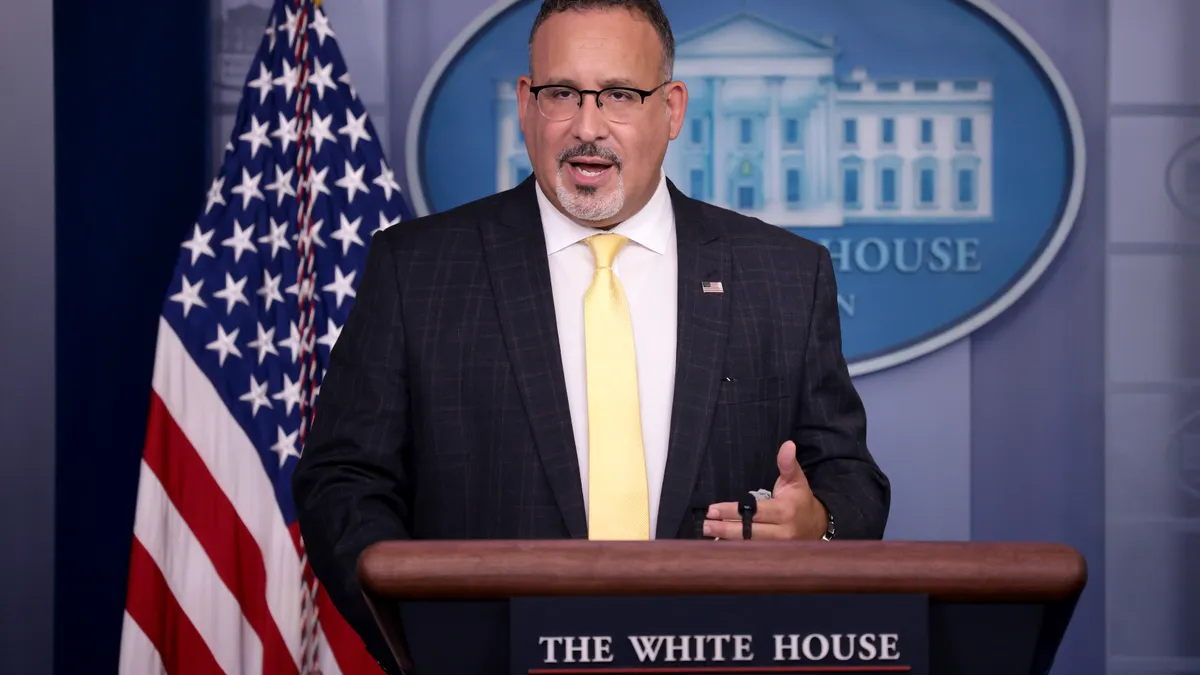The U.S. Department of Education unveiled sweeping regulatory priorities late Wednesday, pinning a publishing date for its final Title IX rule and announcing policy negotiations on such topics as accreditation and distance learning.
The Biden administration’s policy roadmap follows regulatory work over the last two years that largely moved to clamp down on for-profit institutions and bolster protections for student loan borrowers. As Congress remains gridlocked with a Democratic-controlled Senate and a wafer-thin Republican House majority, most substantial policy changes will likely stem from executive action.
In May 2023, Education Department officials intend to publish a completed Title IX rule after U.S. Education Secretary Miguel Cardona issued his proposal last June.
This is a short turnaround compared to the current regulation, which former Education Secretary Betsy DeVos proffered. It took nearly two years to come into effect after she introduced it in draft form in November 2018.
Title IX bans sex-based discrimination in federally funded schools. Though the statute has historically tried to ensure equity in academics and athletics, in contemporary times it has also morphed into a safeguard against sexual violence and rape.
This evolution heralded political controversy that still lingers. Critics argued the federal government pressured colleges to find students accused of sexual assault responsible at the expense of due process rights.
DeVos’ rule attempted to fix that perceived failing by forcing institutions to host complex hearings to adjudicate Title IX reports. Cardona’s proposed regulation would give colleges more flexibility, enabling them to either hold such hearings or pursue a route like the single-investigator model, in which one official investigates and then decides on cases.
A timetable for the finalized Title IX rule is anything but firm, though. The Education Department twice delayed releasing a draft version of the forthcoming regulation, and an agency spokesperson said in a statement Thursday that the May timeline for a final rule is “suggested.”
A regulatory database also shows a missed December 2022 release date for a draft rule outlining colleges’ Title IX obligations to allow transgender athletes to participate in sports aligned with their gender identities.
The issue is particularly hot-button, and conservative policymakers have already threatened legal action against attempts to integrate transgender students into college athletics. Last April, 15 Republican attorneys general wrote to the Education Department that they would sue “to uphold Title IX’s plain meaning and safeguard the integrity of women’s sports.”
The Education Department spokesperson could not peg when the agency intends to put forth a proposed Title IX athletics rule, only saying it is “continuing its commitment to equal educational access for all students supported through the vigorous enforcement of federal civil rights laws in our nation’s schools.”
Officials said in June they wanted to package the policy separately from the more expansive Title IX regulation that's now set to come out in May, a strategy legal experts believe was meant to insulate the larger rule from lawsuits.
Bring on negotiated rulemaking
Beginning in the spring, the Education Department aims to embark on what’s known as negotiated rulemaking, in which officials craft regulatory language by going back and forth with individuals and agencies holding some stake in a topic.
When the department developed its policies on prison education, for instance, it brought in a financial aid administrator and a formerly incarcerated student.
The department plans to tackle a range of subjects through negotiated rulemaking — from accreditors and distance learning to student loan deferments and forbearance.
Accreditors serve as gatekeepers to federal financial aid and try to ensure colleges meet academic, shared governance and budgetary standards.
But accrediting agencies themselves are subject to certain federal standards, and critics have questioned whether the Education Department is slow to restrict poorly performing agencies.
In August, the Biden administration ended federal recognition of an accreditor, the Accrediting Council for Independent Colleges and Schools, for repeatedly failing to follow Education Department rules. ACICS subsequently said it would shut down by early 2024.
However, this action took years to achieve. The Obama administration attempted to pull ACICS recognition in 2016, but the accreditor sued the department, and DeVos two years later reinstated it.
The Education Department plans to start negotiated rulemaking on the following eight topics:





















